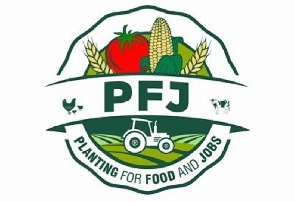- Home - News
- Elections 2024
- News Archive
- Crime & Punishment
- Politics
- Regional
- Editorial
- Health
- Ghanaians Abroad
- Tabloid
- Africa
- Religion
- Photo Archives
- Press Release
General News of Friday, 4 April 2025
Source: www.ghanawebbers.com
GH¢2.8 billion invested in PFJ Phase 1

**Planting for Food and Jobs**
Ghana invested GH₵2.8 billion in the Planting for Food and Jobs (PFJ) initiative. Despite this, the country still imports large amounts of grains and staple foods.
Dr. Amos Rutherford Azinu, a Seed Business Executive at Legacy Crop Improvement Centre, spoke about PFJ's mixed results. He noted that while some crops increased in production, self-sufficiency was not achieved.
In an interview with the Ghana News Agency, Dr. Azinu identified key challenges facing PFJ. Poor storage infrastructure caused post-harvest losses of 20 to 30 percent before products reached markets.
He also mentioned insufficient processing capacity as a barrier to creating storable goods. Distribution bottlenecks prevented efficient movement from farms to urban areas.
Dependency on subsidies created unsustainable costs instead of lasting agricultural systems. Limited market integration failed to connect increased production with commercial buyers effectively.
Launched in 2017, PFJ aimed to transform Ghana's agriculture significantly. As President John Dramani Mahama’s government prepares the Feed Ghana project, Dr. Azinu emphasized learning from PFJ’s mistakes.
He suggested that investments should cover storage, processing, and distribution too. Integrated value chains are essential for reducing imports alongside increased production.
Dr. Azinu highlighted the need for climate resilience in agriculture. Policymakers should focus on drought-resistant crops and sustainable farming practices.
He called for better data collection and analysis to target interventions effectively rather than using blanket solutions. Stronger collaboration with private agribusinesses is also necessary to improve processing and distribution gaps.
Additionally, he advocated for a strategic import substitution approach targeting high-import crops with strong domestic potential.
Reflecting on the GH₵2.8 billion investment in PFJ, Dr. Azinu stressed that agricultural development must address more than just production levels.
For Feed Ghana to succeed, it needs a comprehensive approach covering the entire agrarian ecosystem rather than focusing solely on crop yields.
The discussion on agricultural transformation remains vital as stakeholders work to enhance food security and reduce reliance on imports in Ghana.










